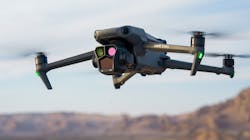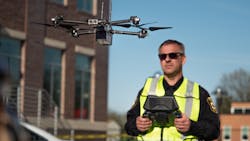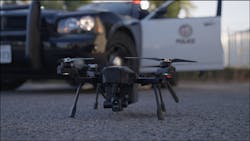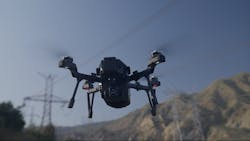In April, law enforcement agencies across Florida scrapped hundreds of millions of dollars worth of still-functioning equipment. That’s when a new state rule went into effect forcing government agencies to ground drones that were manufactured in a “foreign country of concern,” such as China.
This article appeared in the July/August issue of OFFICER Magazine. Click Here to subscribe to OFFICER Magazine.
The mandate clipped the rotors of 63 Broward County Sheriff’s Office drones, and it wiped out the fleets of the Collier County Sheriff’s Office (31) and the Tampa Police Department (7). The Hillsborough County Sheriff’s Office had to stop using 15 of its 16 drones, and the Orange County Sheriff’s Office shelved 19 of its 25.
Although the rule went into effect in April, police departments and sheriff’s offices began pruning their drone fleets as early as December, when it was announced that as of Jan. 1, state agencies would only be able to use drones from a list of approved manufacturers. By the rule’s enactment in the spring, the initial manufacturers list was eschewed, and suitable drones now must not originate in a “foreign country of concern” and must meet certain security and data collection requirements.Law enforcement officials—upset at having to find the funds to replace perfectly functioning equipment— expressed their displeasure at a Florida Senate committee hearing in March. While lawmakers have agreed to set aside $25 million to help agencies replace their drones, they would not allow departments to use non-compliant drones until they stopped functioning.
“You can’t measure what these drones have brought to officer safety,” testified Palm Beach County Sheriff’s Office Col. Robert Allen at the hearing.
Florida’s drone rule has drawn a national spotlight, but it’s not the only state to create restrictions around the types of drones used by government entities. This year, Arkansas passed a law that would require law enforcement agencies to phase out drones made by a “covered foreign entity”—similar to Florida’s “foreign country of concern”—by 2027 and Tennessee banned government bodies from purchasing drones not on the list of federally approved models beginning July 1. These legislative moves illustrate the clash between state governments’ data security concerns and law enforcement’s frustration at being prevented from using effective, lifesaving tools, putting a strain on already tight budgets.Target for lawmakers
One manufacturer has been at the heart of restrictions on law enforcement drones. Chinese-based DJI is the top commercial-use drone manufacturer, and it’s popular in the law enforcement community. But the company, which is headquartered in Shenzen, faces federal and state bans. In Florida, an estimated $200 million in DJI drones needed to be decommissioned.
“The state’s decision to ban drones manufactured in China was based on politics rather than public safety, and sadly, the result may be a matter of life and death,” Andrew Welsh, DJI’s head of global policy, tells OFFICER Magazine. “This isn’t just our view; law enforcement and first responders in Florida have testified that this political move will increase costs for taxpayers, force them to turn to less effective drones, and could even put their lives at risk.”
Welsh said that lawmakers heard directly from first responders about how drones helped saved lives and protected communities
“Unfortunately, speculation and anti-China rhetoric won out over these real-world examples, to the regret of some state legislators who are deeply frustrated with how this process has played out and the lengths to which the original intent of the bill has been skewed,” says Welsh, adding that Sen. Tom Wright, a sponsor of the bill, criticized the changes earlier this year. (“I have never once had the intention of removing any access to any drones that law enforcement has confidently told me pose no threat and are necessary to continue operating at 100%,” Wright said at March’s committee hearing.)
Now, DJI has been working with stakeholders to make sure first responders who want to use their drones still have that option. That includes making sure dealers, agencies and “lawmakers at all levels of government” understand just how vital a tool drones can be.
“The number one concern we’ve had from our law enforcement customers has been their ability to continue protecting the communities they serve,” says Welsh. “Public safety agencies around the country use these critical tools in situations where humans may not always be able to go or where helicopters are too expensive, including rescuing people from forest fires and reaching them in remote or hostile environments. Without access to the drones they’ve come to value, search and rescue operations will lose their eye in the sky, officers will enter standoffs with less situational awareness, and routine investigations could even take twice as long to complete.”‘Security is paramount’
If DJI drones face a hostile governmental environment across the country, then Skydio drones have found safe harbors in many states. The company, which is based in San Mateo, California, was one of a handful of manufacturers on Florida’s initial approved list, and its X2D drone is on the federal cleared list. In a statement emailed to OFFICER Magazine, Skydio praised Florida for prioritizing drone use security concerns when it comes to its government agencies and its citizens.
“Most of our customers today are organizations that serve the most fundamental needs of every resident—keeping our communities safe, our roads accessible, our lights on and our nation at peace,” the company states. “Security is paramount in any endeavor which touches these critical infrastructure functions. We applaud the state of Florida for demanding the highest degree of UAS security. And for easing the transition for state agencies with its $25M grant program.”
Florida’s attention to security, the company believes, will help refine and grow law enforcement drone agencies.
“Most of the conversations we have with public safety agencies are focused on how to successfully deploy a secure and scalable Uncrewed Aerial Systems (UAS) program,” states Skydio. “There are some agencies with mature programs—Florida Highway Patrol and the Pasco County Sheriff Office are just two examples—but for many, the use of drones for overwatch, accident scene reconstruction, search and rescue, and tactical response is still in its early days
“We encourage all prospective UAS customers to ask vendors the hard security questions and demand they meet the stringent security requirements laid out by the Florida rule,” the company adds. “Once that is satisfied, ensuring the program can scale is a function of how autonomous the drone can perform.”
Even though Skydio hasn’t felt the pain of restrictions and bans in Florida and other states, the manufacturer understands the impact these measures can have on police and sheriff’s departments. That’s why the company has started an initiative that could help those law enforcement agencies replenish their newly depleted drone fleets.
“We want to partner with agencies making the shift to secure drones and recently announced a trade-in program offered to any state public safety organization that offers fair market value for existing drones replaced by new Skydio drones,” the company states. “We are the only manufacturer to offer a U.S.-wide trade-in program and we’re proud of the way this program lets us serve our partners.”
Keeping it simple
For Teledyne FLIR product management executive Kelly Brodbeck, designing a drone to comply with an ever-shifting legal playing field can be a challenging prospect.
It’s a little difficult to know what each state is going to do,” he tells OFFICER Magazine. “And the federal government may do different things as well.”
When it came to developing the company’s SIRAS drone, Brodbeck says it was designed with simplicity in mind. The drone connects to “nothing” and stores imagery on a microSD card. The closed system is a security feature to prevent outsiders from hacking into the device.
“It doesn’t connect to the Internet,” says Brodbeck. “It doesn’t send data to the cloud, and by taking that approach, we felt we were immune to any law that came along. And immune is probably not the right word, but we wouldn’t be subject to any data protocols or concerns about data security because it simply doesn’t connect to the Internet. There’s no way to take data that’s being transmitted through the air or upload it to the cloud. You can’t get your hands on that.”
Even though lack of connectivity was given a high priority, Brodbeck says “a more fundamental design principle” for the SIRAS was giving the pilot as much control as possible
“The pilot is completely in control,” he says. “Nobody knows who they are, what they’re doing. We don’t know who the pilot is. There’s no account that you have to set up, and (pilots) love that control and safety and security.
“So with these design principles, our thought as the Florida law and others have come along, or are coming along, is we feel like we’ll always be compliant because we’re not transmitting data to a place either back to ourselves or to the cloud or anywhere that anybody can get their hands on that data,” he adds. “And that’s that’s the concern that’s motivating the Florida legislation.”
The future
While Florida lawmakers might be concerned about foreign interests accessing government data, Brodbeck understands that state law enforcement doesn’t necessarily share the same fears. For police, drone data needs to be secure as criminal evidence, not as state secrets.
“We do hear from officers (who say), ‘I take pictures with my drone. I don’t really care if the Chinese government sees some guy running down the street as we’re arresting them,’” says Brodbeck. “Their concern is more chain of custody and making sure that critical evidence cannot be poked at or questioned. Because it’s been in their custody and their control. No one has the ability to manipulate it. It’s kind of a type of data privacy, if you will. Privacy on behalf of law enforcement.”
Looking out at the current law enforcement drone landscape, Brodbeck calls this a period of transition for the industry. He characterizes Florida as “the tip of the spear” when it comes to restrictions that could eventually keep Chinese-made drones out of police drone fleets.
“I think as American alternatives come forward—SIRAS being just one of them—as those come forward, I would expect certain places to be more aggressive and saying, ‘Look, there are drones out there. They’re not expensive. They’re not made in China.’ We can all feel good about them for all sorts of reasons. You’ll just see a continued trend toward pushing Chinese made drones out of the United States.”
This article appeared in the July/August issue of OFFICER Magazine.




